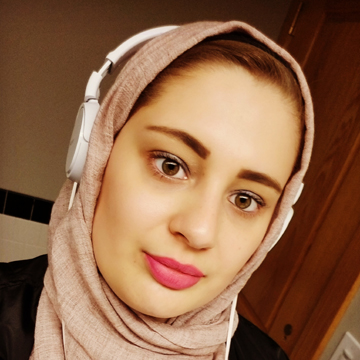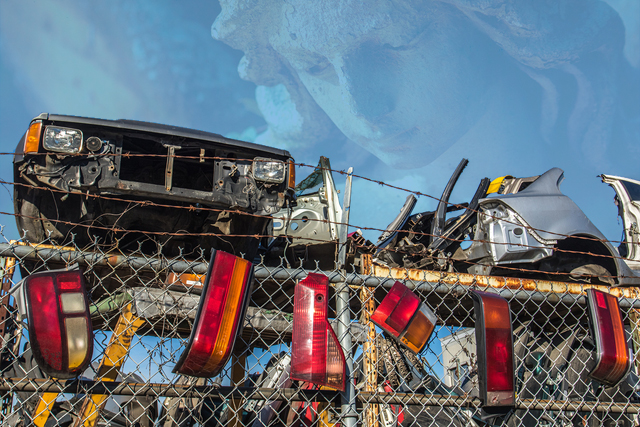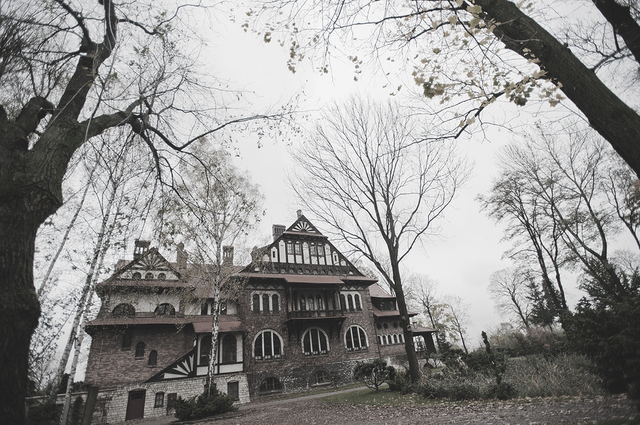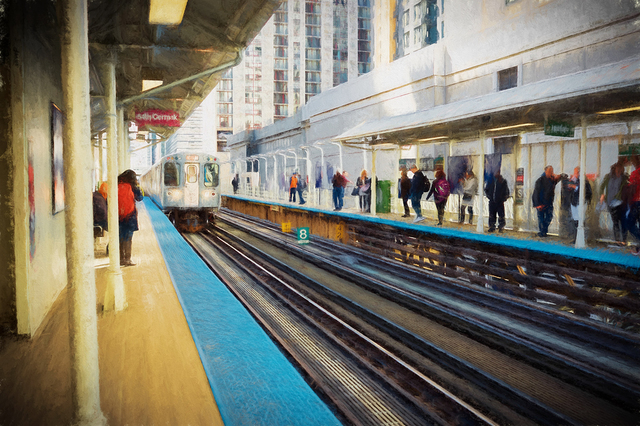It costs you nothing to accept the fact of an old aunt’s vision—until suddenly that growing mania creeps inside you, seeking to nest and incubate.
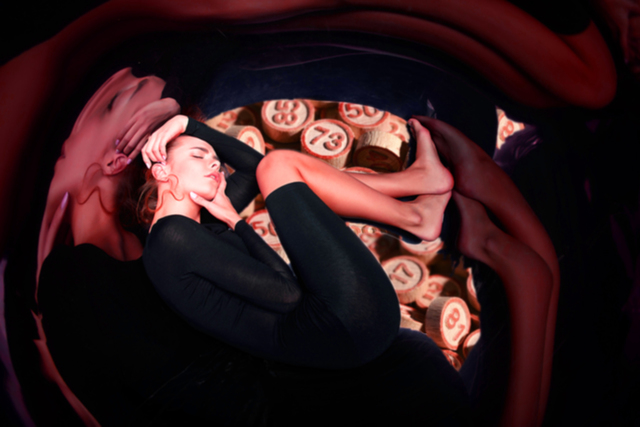
Nine days after the death of Uncle Boris, two days before my abortion, a week into the holy month of Muharram, and thirteen hours before the stack of coupons beside the telephone was due to expire, Aunt Kitty set out to buy a head of cabbage, a tube of generic brand anti-itch cream, and a bag of black cherry flavored hard candies. Of course, none of this is precisely accurate. The morning was fine only by the standards of an elderly Russian woman accustomed to the winters of both Brooklyn and Moscow, which is to say that it was not snowing and the power had not gone out, nor was an assault by secret police on the way to the market very likely, though the wind chill was thirty below and the icy sidewalks sparkled grimly like tarnished glass. The coupons, it would turn out, had in fact expired several months before, a mistake which Aunt Kitty would fail to recognize until she approached the register with her three items and wizened leather change purse. Her insistence that the coupons were still good sparked an argument with the cashier, a young West African immigrant whose English was hardly better than my aunt’s. Who, in her obstinate anger, her hatred of being misunderstood (and perhaps, too, in the madness of the newly widowed) smashed her purchases on the floor, then proceeded to slip on the hard candies and anti-itch cream and fall, knocking her ancient cranium (permed hair dyed the color of a new penny, tied in a moldering white silk scarf and yellow rain bonnet) on the counter, necessitating her transport to St. Mary’s Hospital.
The month of Muharram was holy only to me, the Muslim convert daughter of Orthodox Russian immigrants, and even so, not that holy. My faith had become soft and runny as a wedge of Stilton thanks to a series of minor first-world catastrophes (a vicious debt collection lawsuit, rejected grad school applications and a novel nobody would publish, the loss of a lukewarm boyfriend to a season of archeological fieldwork in the Maldives, and now a pregnancy and the death of my beloved uncle). The abortion, which I’d been contemplating and discussing for several days with Aunt Kitty over glasses of tea and vodka while Uncle Boris tottered around his stacks of newspapers and books in the living room, dependable as ever in his lovable paranoid senility, was still only theoretical. I couldn’t imagine the knot of fear and nauseous disgust in my stomach ever coalescing into anything vaguely human, much less one of those pudgy little dolls of doughy fat and sticky limbs that some of my cousins were already lugging around on their hips. And as for Uncle Boris’s death—well, now we come to it. You see, en route from the supermarket to St. Mary’s, semiconscious and bleeding in the back of the ambulance, the rump of her Goodwill khaki slacks smeared with anti-itch cream, it was revealed to Aunt Kitty that Uncle Boris had not in fact died.
Let us backtrack to the night of Uncle Boris’s death, or departure rather, when he is preparing to head out to Our Lady of Czestochowa church for his Saturday night bingo game. Uncle Boris was, as Aunt Kitty was fond of saying, a dumpling of a man—soft, plump, round, and best served with onions and gravy. You’ll have to forgive the food metaphors, but at times Uncle Boris simply was more vittles than man. In winter, dressed in his thick black parka, he resembled a Ho Ho, his favorite American sweet, which he would share with me on the front stoop in summer, even after I’d proceeded from a bouncing American childhood to a dour cross-cultural adulthood, when my problems had grown from fights with my parents over wanting Twinkies in my lunchbox instead of soya sticks to fights over taking Qur’an classes at the Islamic center in Flatbush and my screeching mother refusing to let me leave the house in a hijab. In summer, when the sweat poured down his bald globular head, Uncle Boris looked like one of the whole onions Aunt Kitty would put in a pan to roast and steam with a leg of lamb. His hands, with their fat stubby fingers, by the labor of which the family had been transported from the “total fucking shitshow” (as the younger cousins would put it) of Stalinist Russia to the relative comfort and permissiveness of America, suggested the Vienna sausages he took for an afternoon snack along with his tea and black bread. And at all times he smelled of warm domestic things—baking bread, candlewax melting in front of the icons in the kitchen niche, the last inch of warm beer at the bottom of the bottle when my father and uncles drank together.
On this particular night, Uncle Boris smelled of rassolniki, a scant reheated serving having been consumed in front of a rerun of “Oprah” in the living room, whence he’d been banished by Aunt Kitty so that “Ruqayya and I can discuss women’s matters.” Meaning my absent boyfriend and possible abortion, using my preferred Muslim name to indicate the gravity of the situation. Usually when I corrected her she’d snort and cluck and call me by my old clumsy Russian name anyway, but I guess she was afraid of me running off and throwing myself into the frozen river, the way the girls in her village had done when they were “in trouble.”
Russians have such a taste for failure, like our sour pickled soups at which westerners wrinkle their noses. Everything from the epochal gulag-sized fuckups of a nation down to the little everyday disappointments of family and lovers, but especially do we love a failure with bombastic flourishes and a tinge of the ridiculous. My illegitimate pregnancy and inability to secure a career or a husband would one day be stirred into the familial pot to add a subtle zest to the borscht of disappointment the elders served up whenever they got together or met a commiserating countryman. I was learning to savor it too. Every unreturned text message to Boyfriend Vivek, every bout of morning sickness, had the self-mortifying pleasure of defeat, one with which Uncle Boris had not been unfamiliar himself.
Childless, the luckless progenitor of literary stillbirths, employed intermittently as a janitor or cook, his English never progressing beyond a crowlike cackle, Boris was a pot of cold congealing cabbage in a country that liked her immigrants to have all the artificial MSG-laden zest and colorful assimilation of faux-Chinese takeout.
“Uncle Boris can stay,” I protested. I was feeling nauseous amidst the odors of day-old soup and stale tea, in the stern atmosphere of maternal censure. I wanted the avuncular comfort of bumbling Boris, with his wide-mouthed laugh full of missing teeth, his delightful conspiracies and his hands smelling of ink and old paper from hours among books and newspapers, researching reptilian spacemen and interdimensional travelers. There had to be another universe where none of this was happening—the pregnancy, Boyfriend Vivek’s Maldivian venture, my aborted career; a universe in which God was not turning His celestial back on the colorful little garbage heap of my life. I wanted to believe Uncle Boris’s blini-shaped head held the blueprints to build a spaceship out of the scraps of this world to take us there.
But it’s selfish of me to hog this narrative when Death awaits Uncle Boris in the basement of Our Lady of Czestochowa in the form of an innocuous ham sandwich, and Aunt Kitty, unwitting instrument of fate, is shooing him out.
“You’ve got bingo tonight,” Kitty prodded.
“Stay, dyadya,” I pleaded, grabbing his doughy hand, damp and yeasty. He embraced me with a scrap of poetry, the sort of florid verbal handkerchief he’d used to wipe away the tears of my small disasters as a child:
“Lilies of gossamer light will bloom in the field of your despair,
watered by your diamond tears.”
The first time I heard the Qur’an, it reminded me of Uncle Boris’s poetry—the liquid sounds taking flight from the mountainous shoulders of consonants, whispering syllables emerging from the omphalic depths of gutturals. Or rather, it made me hear in Uncle Boris’s poetry an echo of the divine, like he’d pieced his verse together from God’s table scraps.
“I don’t think I can cry a fetus away, but thanks anyway, dyadya,” I said.
“Bingo!” Aunt Kitty exclaimed, pushing a hat that resembled a feral Maine coon into Uncle Boris’s hands. “Don’t leave Hector waiting!”
Bingo was Uncle Boris’s prime social event of the week, one that called for a certain amount of racial tact and sensitivity, which he categorically lacked (political correctness and multiculturalism being dismissed as “American nonsense,” the same denigration he applied to frozen TV dinners and the Electoral College). As the host church was Polish Catholic, many of the seniors who gathered there Saturday nights with their cards and chips were Poles, but many Mexicans attended as well (nearby Guadalupe Hidalgo not offering bingo). Seating fell along ethnic divisions and there was often much grumbling from the Poles, when the Mexicans won a few successive rounds, about how certain people should go back to their own church. Uncle Boris (Russian, Eastern Orthodox) and Hector (Dominican, Seventh Day Adventist), being outsiders of a sort and sharing a love of liquor and raucous stories, found themselves fast friends. The rest of the seniors left them to their own diversions at the back of the basement, where they passed flasks of vodka and rum and stories of reckless boyhoods under their respective dictatorships.
As Uncle Boris shouted a goodbye to Aunt Kitty on the steps of their brownstone and took some generous nips from his flask before bundling it into the Ho Ho jacket, as I began to hyperventilate in the kitchen and reach for the vodka myself, as Hector set up the cards and chips in the back of the basement of Our Lady, already generously tipsy, fate was busy in the kitchen upstairs. I realize we mustn’t be angry with Mrs. Helen Pryzbyl, who after all had been preparing refreshments for social events at Our Lady for nearly thirty years and had never had a casualty yet. Perhaps Uncle Boris could’ve eaten anything that night and the result would’ve been the same. “When Allah calls, you come,” as my imam is fond of telling me.
The doom-bearing hands of Mrs. Pryzbyl had spread an array of ham and tuna fish half-sandwiches, baby carrots with spinach dip, and a plate of sugar-free gingersnaps, along with tea and coffee, for that Saturday's bingo game. Uncle Boris arrived early, his face red from the cold and nips of vodka on the train. Hector’s grasp of the English language being as feeble as Boris’s, the pair greeted each other with a hug and the bumbling multilingual immigrant patois only they seemed to understand. Flasks changed hands and Uncle Boris loaded up a paper plate with sandwiches and cookies, winked and flirted with Mrs. Pryzbyl using the few Polish phrases in his arsenal, and proceeded to the back of the basement.
As Hector would later explain—hiccuping with tears and drink in Aunt Kitty’s kitchen while the latter howled with the senseless rage of widowhood and my mother and uncles tried to console her, while I listened to the scene from under a musty afghan on the couch, my own drunkenness sliding perceptibly into a hangover—Boris was drunk (“happy” in his and Hector’s phraseology) and hungry, eating quickly, and when the proctor called “G-9” and Boris hitched in a great lungful of air to shout “Bingo!” a piece of ham sandwich leapt into his windpipe. Hector, panic punching through his warm comfortable drunk, attempted the Heimlich while the terrified elders looked on. But Boris’s face grew purple as a beet and he began to sputter ever more weakly, until the old ladies, in both Polish and Spanish, crossed themselves and slowly began to pray. When the paramedics arrived, they found Hector puffing away in futile CPR as Father Czarnecki read the last rites over the body and Mrs. Pryzbyl wept into her plate of sandwiches.
“He was my best friend,” Hector explained in the kitchen. “I did everything I could.”
On my couch, delirious with alcohol and the disorienting sting of grief, a laugh escaped me. Many a family member had died far more gruesome and violent a death, but rarely one so ridiculous or senseless.
“Leave it to Uncle Boris,” I muttered, slipping into sleep.
The next week was an undifferentiated blur of grieving relations and funeral preparations. I’d been sleeping on Aunt Kitty and Uncle Boris’s couch for a few weeks anyway (the apartment had been in Boyfriend Vivek’s name) and the others encouraged me to stay, perhaps thinking it was wise to keep the two most unstable members of the family under close observation in one house. Tasks of cleaning and cooking and Kitty-comforting were thrust into my hands by my mother and the remaining relations of Boris and Kitty’s generation, and in the drama I forgot about my own troubles for a bit. The morning of the funeral I had to run out of the service to vomit, just as a lachrymose great-uncle was reciting a bit of flamboyant Boris verse. After emerging from the bathroom to find my mother standing there, arms crossed, her bleached blonde hair and impenetrable makeup a perfect mask of false youth and efficiency, asking, “Polina, you’re not in any kind of trouble, are you?” I talked with Aunt Kitty that night and made the appointment at the clinic.
My impending abortion seemed to cheer her up—the thrill of keeping it a secret from the rest of the family, preparation for my post-surgery care, the soothing balm of schadenfreude. I was comfortably ensconced in my own self-pity as well, eating chips in Uncle Boris’s old chair with a pile of dirty tissues (Boyfriend Vivek, gleefully disporting himself amongst the ruins and, one supposes, maidens of the Maldives, had merely responded, “Do what you want, just leave me out of this” to my news of the abortion). I was shocked out of my reverie by the call from the hospital. Aunt Kitty, regaining consciousness with the addition of a couple of stiches in her scalp, had excitedly asked the staff to contact her favorite niece, and no other family. Stumbling into sweatpants, slipshod hijab, and Uncle Boris’s Ho Ho parka, I took the bus to the hospital, to be met with the news that,
“Your Uncle Boris is not dead. He came to me, Ruqayya, just listen.”
Listen I did as Aunt Kitty, glowing like a saint, narrated her vision.
“I hardly knew where I was, Ruqayya,” she began, “just this awful throbbing in my head and the sirens so loud, lights flickering outside and strangers bending over me. I thought maybe I was dying, going to join your uncle, and I began to pray.”
Her penny-colored perm crushed against her feverish face, eyes aglow, Aunt Kitty grasped my hand as she grew more excited in the telling. As she’d prayed, the sound of the siren and the dark figures of the paramedics fell away, subsumed by a honey-hued glow and a smell she described as a mingling of “honeysuckle and your dear uncle’s scent—you know how he always smelled like rye bread and beer?”
Two figures materialized out of the golden haze—one large and fair-haired, a pair of white wings on its back folding out to embrace the whole scene with a sense of calm and protection. The other was shorter and rounder, dark of eye and hair and smile.
“It was your uncle, my dear! I thought he’d come for me, that we were going to heaven together.”
In this vision, Uncle Boris wore the same parka I did now and, I was amused to note, still had the fatal ham sandwich in hand.
“Ekaterina Ivanovna,” he’d addressed her, as he had in the early days of their courtship, when they were newly arrived in the city from the fresh and virile country, in love with their youth and each other and the dangerous grime and glow of Moscow. “My dear silly goose, I am not dead, and you certainly are not about to die. Could a dead man do this?” And he polished off the rest of the sandwich and belched, loud enough that the angel’s wings quivered.
“Or this?” And he leaned over and kissed Kitty, his lips warm and moist, the flavor of ham and vodka lingering about them.
“But we put your body in the ground,” Kitty had protested.
“Is the body what matters? Is the body life? I tell you I am more alive than ever before, Ekaterina Ivanovna.”
“Then where have you been? Won’t you come back home? I can’t do this alone—the electric is past due, I don’t know how I’m going to deal with the landlord without you, and Ruqayya, my God, what a mess—”
(“Thanks, Aunt Kitty,” I interjected at this point.)
“I am always with you, Ekaterina Ivanovna, in a country of light and water that exists but a hair’s breadth away from your own. A country beyond life and death. Seek for it constantly, my Kitty. I am on the other side of the mountain.”
“The light began to fade and the angel drew his wings around your uncle,” Aunt Kitty said. “I begged him not to go.”
“A country of light and water,” he repeated, “always. I will return at the end of all things.”
Aunt Kitty clutched my hand in both of hers, tears squeezing out from her tightly shut eyes as she breathed deeply.
“He’s still here, Ruqayya. I am going back to him.”
Aunt Kitty came home with me that night. After preparing her a haphazard dinner (“The American children never learn how to cook right,” she’d scolded over my Hamburger Helper) I’d coaxed her into bed early. Not a word had passed between us concerning her vision since we arrived home, but it was understood that the rest of the family could not know about this, any more than about my abortion. Ours was now a house of cloistered women and their lonely secrets—a subterranean smell like a cellar full of turnips. That we do well too, pickling and canning our sorrows and secrets, a familial art. But where was Boris now, to taste the vinegar brine with me, to crunch my salty preserved secrets between his rotten teeth? He’d been the stomach of the family, capable of digesting what the rest of us could not.
I curled up on the couch with the lights out, TV muted. Uncle Boris’s stacks of books towered just as he’d left them, casting strange shadow geometry in the blue TV glow, shadow-mountains like the one he claimed to be on the other side of. All I could think of, reviewing Aunt Kitty’s story, was the Mahdi, the last legendary Imam of the Shi’as. He’d disappeared sometime in the tenth century after hiding in a cave for several decades, communicating with his followers only through four deputies who received instructions at the mouth of the cave. When the messages stopped, the ulama, scrambling, declared that the Imam had not died but had been occulted away into another realm, from whence he’d return at the end of times to herald the Day of Judgment (all of this information having been picked up in my “Islam for Converts” class at the Islamic center in Flatbush, where I also happened to pick up Boyfriend Vivek, Hindu has-been to my Orthodox outcast).
I liked the idea of my uncle in a trans-dimensional cave in the mountains of Iran, eating sausages and watching daytime TV in his bathrobe and slippers.
“The other side of the mountain,” he’d said . . .
Turning off the TV, I settled into the swirl of snow and streetlights outside the lace-curtained windows. I imagined Boris’s transubstantiated body and soul as that lovely chaos of photons and frozen water droplets, his country of light and water existing in the black space between snowflakes. Would the fetus join him there after I aborted it tomorrow? I pictured Boris in his cave again, this time with a salamander-sized puppet of blood and tissue sitting on his shoulder like a parrot, laughing along at the sitcoms in a tiny watery voice like the gurgle of blood from an artery. I shivered and pressed my face to the couch, the physical feeling of revulsion that had been coiling in my abdomen for the past few weeks rising up to strangle me.
I tried to chase the anxiety phantoms away, these superstitious remnants of my Russian faith. Islam was rational and no-nonsense, a curative to the messy web of superstitions in which my family was bound up.
I could hear Aunt Kitty in her bedroom, tottering around the stacks of newspapers and books like a senile ghost, haunting the memories of her life with Uncle Boris. I felt like a ghost too, stuck in the purgatorial void of this pregnancy, this winter, this decaying Brooklyn brownstone, this failing family bereft of its patriarch. The morning would bring relief, had to, I told myself as I buried my face into the rough upholstery of the couch that still smelled like Uncle Boris, like damp wool and tea and vodka, the smell of a barely remembered motherland.
Morning came bright and frigid. The sunlight and the cold were rows of teeth gnashing and gnawing the pale meat of my body between them. It was the tenth day of Muharram, Ashura, a day of redemptive suffering. I rose to perform the dawn prayer and added at the end, in Russian, “Poglotit’ menya.”
Devour me.
At the moment I couldn’t imagine a more merciful aspect of God than that of the Devourer. I hoped that’s what death would be like, being devoured by a mercy that enfolds and digests you like a great stomach. Maybe, through some alchemical transformation of vodka and ham sandwich, through the influence of the holy days of the new year, Uncle Boris had passed beyond life and death, consumed by God’s jaws of grace and light, a morsel in the stomach of the divine.
A plate of blini with sour cream and caviar sat on the kitchen table. As a child I’d shrunk from this embarrassingly foreign breakfast. I wanted the bright happy American breakfast foods of my friends—sugar and marshmallow cereal, donuts with frosting bright as American optimism with capitalism-green sprinkles. But today I welcomed the sight of it, even if I wasn’t supposed to eat before the procedure.
“Eat,” Aunt Kitty urged, her bony hands wrapped in their webs of veins thrusting a fork before me. She hummed as she turned back to the stove, merrily knocking together pots and pans and silverware. She’d been nauseously cheery since her vision. Earlier one of the older cousins, dropping off some food, had remarked that she seemed to be entering a second youth.
“Has she found herself a new young man already?” he’d winked.
“It’s probably just the painkillers they gave her at the hospital.”
“Aunt Kitty, I’m not supposed to eat before the procedure, the doctor said so,” I said now.
“You eat, Ruqayya,” she insisted again. “We’re not going to the doctor’s today.” She kissed my forehead, pushed the steaming plate closer, and began to wash dishes in the tarnished steel sink.
“But the abortion’s today. I made the appointment a week ago.” The moist light in Aunt Kitty’s eyes, her body trembling in the shaft of early sun as though singing with some great barely contained energy, made my stomach turn nervously. The salty smell of the caviar was suddenly choking.
“But Ruqayya, Polina, my dear,” she said, sitting down next to me and clasping me with her wet hands smelling of dish soap. “Haven’t you realized it yet? Think! Your dear uncle’s passing, this pregnancy, his message to me—he’s coming back, Ruqayya!”
“Aunt Kitty, no. Listen to yourself.”
“You listen, Ruqayya. I couldn’t sleep last night—you know, since your uncle visited me, it’s like I hardly need any sleep at all, I feel more alive than I have in years, since I was a young thing like you in Moscow—of course I was prettier, I smiled more—”
“Aunt Kitty!”
“It’s true though, dear. Anyway, last night I was going through some of your dear uncle’s boxes and papers—you know what an educated man he was”—referring, apparently, to Uncle Boris’s extensive self-education in conspiracy theories and the occult—“and drinking a cup of tea. You know, when I was a girl, the women who came into my grandmother’s bakery would read each others’ tea leaves in the kitchen. I would laugh at them, superstitious old women, I thought, but I have seen some things since then, and I guess I am a superstitious old woman now.”
“Aunt Kitty, stop.”
“Those women had seen many of their men die, their sons sent away to camps, where one did not know whether they lived or not. They lived in the doorway of death, those women, and they knew how to ask it for answers. I remembered this last night, and so I finished my tea and dumped the leaves out, onto the pages of his journal, below the last poem that he wrote—he wrote it for me, you know. A romantic to the very end. And the leaves, they looked just like a little baby, but with your uncle’s round head.”
“I’m not listening to this,” I said, getting up from the table, pushing away her food and her hands, her eager eyes on my belly. “None of this makes any sense. Your tea leaves told you that Uncle Boris is about to reincarnate himself in my goddamned abortion?”
Aunt Kitty slapped me.
“You have no faith in life. Only death is real to you.”
My cheek burned, stinging with the strength that still brooded in the old immigrant-woman’s frail-looking limbs.
“I’m going to text Papa and have him come sit with you, and then I’m going to the clinic,” I said as calmly as I could, turning my back on her to find my phone and jacket.
“You can’t stop this, Polina.” Her voice followed me out of the door into the sepulchral cold, heavy with the weight and history of my old name.
By the time I clanked through the metal turnstiles and climbed to the elevated platform, I was sweating beneath the Ho Ho jacket and my breath was coming ragged in my throat, raw from tears and the cold. It had cost me nothing to accept the fact of Aunt Kitty’s vision; the porous boundaries of my cosmology could expand to accommodate that. But this now—it felt like Aunt Kitty’s growing mania was creeping inside me, seeking to nest and incubate within my body.
Around me, the footsteps of harried morning commuters clanged hollow in the frozen air against the iron stairs, a sound that made my eardrums feel like frost-rimed blacktop. I couldn’t tell if the warped wooden platform, glittering with boot-smoothed patches of stubborn ice, was quaking beneath my feet as the trains rushed in, or if it were the city itself, that was quaking like judgment day, when mountains would be as tufts of carded wool and men scattered like moths. Perhaps the tectonic plates composing the fractured bits of my soul were shifting, rubbing together their jagged edges. My limbs were full of a buzzing static, and a vibration like a panic attack was beginning to thrum in my stomach. Through the bodies of commuters, appearing like one of the witches in the old stories she’d told me as a child, Aunt Kitty, in her long black dress and scarf, emerged.
“Polina,” she called. I was disgusted by my urge to recoil from her voice, to push away whatever it was in her that had scared me this morning—madness or fate or voices from the other side of the mountain, from wherever Uncle Boris had gone. She tried to move towards me through the bodies, bent and black, in a blaze of morning light, as if the sun were opening its jaws to devour her. Her face was obscured to me, turned to the mirage of the city, which, through the haze of sun and cold, pain and grief, could’ve been Brooklyn or Moscow, or whatever City of God Uncle Boris had discovered on the far side of the mountain.
Cityward, the lights of a train appeared, pale eyes rushing out of the larger light. Bodies moved closer to the edge of the platform, crowded her away from me.
“Aunt Kitty!” My panic morphed into a fear for her.
I heard Uncle Boris’s voice, as if it came from within me: “I will return at the end of all things.”
The sun lanced off the approaching train, coronas of light singing around Aunt Kitty as her boots left the platform—a step or a slip, I couldn’t tell. I saw no impact, only a burst of light, a smell like ham and vodka. Wheels screamed on the tracks, shouts rose around me like startled pigeons—but I saw no body, no blood. Shapes hovered between me and the light and noise. I sobbed, inhaled the cold, the daggers of lights, whispered,
“Poglotit’ menya.”
Copyright © 2018 by Heather Rick.
